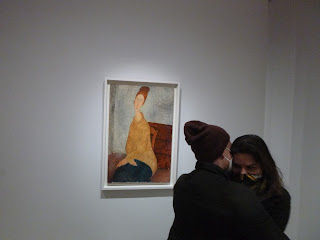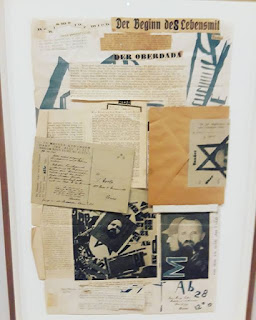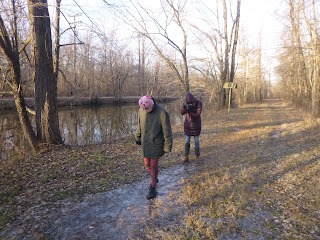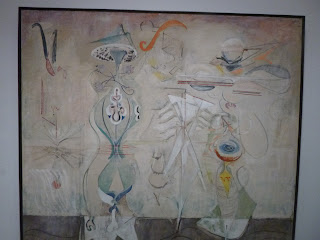Making our
way to Princeton, we stopped in Sunset Park for some food at LanTing
Hot Pot, on 7th and 58th street.
At first
the place looked closed, but after a knock on the door, a lone waiter welcomed
us, bringing us to a table outside, turning the holiday lights on for the only
customers there, assembling a hotpot for us.
From the broth,
then steam poured into the air, flavor after flavor, from the soup. A discovery
from our trip to Hanoi, one flavor after another poured into our souls,
comforting us.
We talked
with our waiter, a young man, about his work the last twelve months. It had
been a long year, the restaurant closing, then reopening, with outdoor dining,
then indoor, then no indoor, with less and less people coming out to eat.
"But
we still have our health and that's all that matters," he gushed, as if
convincing himself.
But he was
right.
Out to
Princeton we drove, arriving to a quiet house on Christmas eve with my mother.
Wearing a
pink sweater, she greeted us.
“Mom, you are a winter,” says Caroline.
My brothers
and the usual friends who come every year, stayed home, avoiding travel and the
risk of COVID. It's an odd quiet out there, a little
rain, we're separated and together, Dion in San Francisco, John in St Paul,
Steve in Switzerland, James in Brussels, will in Stockholm, I'm thinking of
Bruce not here...so many others away....everyone who used to be here...separate
and together....and separate...a fleeting sense of time passing... looking,
hoping for peace.
But that's
not always easy to find, even if mom does say, “it’s gonna be better soon. Hope dies last!!!!”
Wrapping
presents, the dislocation of the moment hits me, despair grasps, the kids
growing up and away, family separating, our time together ending, transforming.
We’d spend the holiday eating and cooking reading and hiking
the D and R trail, roller skating, watching movies, making rolls, catching up
with friends in Brussels and London and going to the Princeton Record Exchange.
Walking along the trail, the light reflects in the water in
the canal, striking, vibrant light, illuminating, pointing us toward something
larger, beyond our reach. Looking I feel the invincible summer Camus sees
in all of us.
The next morning, I jump on the solitary bike, thinking of Sea
and Sardinia and past years, past travels, trying to get right with the
world, about DH Lawrence’s journeys.
“It is a question, practically of
relationship,” writes Lawrence. “We must get back into relation, vivid and
nourishing relation to the cosmos and the universe . . . . For the truth is, we
are perishing for lack of fulfillment of our greater needs, we are cut off from
the great sources of our inward nourishment and renewal, sources which flow
eternally in the universe. Vitally the human race is dying. It is like a great
uprooted tree, with its roots in the air. We must plant ourselves again in the
universe.”
I'd spend the entire break, well actually the entire year, trying to find a way to plant myself, to be a part of, not outside of it. There is an agony to feeling a part of everything. But its probably better than being separated. That’s where our ego gets us.
Under the tree, I find a wonderful book from Caroline about Borges and the hero’s journey, the one we're all on, even in the Garden State, watching movies, reading Borges and thinking of the chance encounters, the sentimental education, that changes us.
“The journey of the hero is about the
courage to seek the depths;” writes Joseph Cambell, a subject of Parini’s
narraive in the Hero’s Journey. “… the image of creative rebirth; the
eternal cycle of change within us; the uncanny discovery that the seeker is the
mystery which the seeker seeks to know. The hero journey is a symbol that binds,
in the original sense of the word, two distant ideas, the spiritual quest of
the ancients with the modern search for identity, “always the one,
shape-shifting yet marvelously constant story that we find.”
For Borges, it points toward the library, his image of a universe,
god the chief librarian.
Our paths through this library take countless directions,
mine from Dallas to California, to Poughkeepsie, where I found a literary
biography of the Argentine master three decades ago.
I spend days in there reading, in harmony. He’d take me to Marquez, who took me to
Faulkner, who took me to New Orleans, back to Dallas, to California, back to
that library, where I started writing and reading about it all.
I was and I wasn't so good at just being a part that
universe this year.
I was in it and outside of it the whole time.
Thinking about the
events of the year that came and went, we can see a few chapters. It started
with those battles around impeachment, driving to DC with Ken to Swarm the
Senate. Each day there, we hit a wall. The day of the impeachment vote, a few of us
got arrested, but not enough to have an impact. All afternoon, I sat in jail with a couple of
veterans of the Vietnam War, feeling like we were fighting the same behemoth,
the racism and militarism, inequality and no nothingism, that got us to this
peculiar spot.
The first two
and a half months of the year made sense... reading and grading and classes,
blocking a natural gas pipeline in Greenpoint, going to the baths for
Valentines day, to Judson memorial and demos, making plans for summer, roller
derby tournaments, and then the world turned upside down.
I remember
a dinner with a friend, a doctor, in late February, chatting about what would
happen. Not to worry he said. A few weeks later, he tested positive.
I left his house
and finished the first six weeks of classes of the semester in the classroom.
And then we
locked down.
Nine months
of lockdown followed, moving everything online, canceling plans, reading, and
adapting as best as I could.
After
classes, I sat on roof, with a drink and a book, looking at the city.
Our book
group moved to weekly, online zoom meetings, navigating from Don Quixote’s
journey with Sancho and Rocinante, to Mary Oliver essays about her journeys
with her best friend Walt Whitman, to Carolyn
Forché's painful memoir, What You Have
Heard Is True, Nella Larsen's 1929
novella Passing, Samuel R Delany's Motion of Light in Water,
Hettie Jones' How I Became Hettie Jones, Ferrante's lying life of
adults, and Sentimental Education.
Each book,
each story reminded me, there are other worlds, other times. The line from thisto that, that was the interesting part.
I might not see them, but they were there. That was where the mystery
unfolds, the journey takes shape. I saw them in the streets. I saw them reading in the mornings and in the
afternoons. Reading on the road from Cervantez
to Borges and his journey with Parini, who Borgs referred to as Sancho Panzo, their
car, Rocinante. With each reading, I traced another story.
“When you find a writer who really is saying something to
you, read everything that writer has written,” says Cambell. “You will get more
education and depth of understanding out of that than reading a scrap here and
a scrap there and elsewhere. Then go to people who influenced that writer, or
those who were related to him, and your world builds together…”
All year my
world built together and came apart.
I saw them
in and in skies as afternoon turned to evening.
The sunsets
offered solace. I’d come upstairs after bad news. And there was plenty of it in 2020.
The roof
was also the place for goodbyes. And this year there were plenty of them. Cultural icons and friends, Larry from ACT UP
, Georgiana from City Tech, Ed Shaw for AIDS organizing, Nushawn from Caroline’s
high school, Elizabeth from VOCAL, Bobby from CitiWide, Edith Louise from Occupy,
David Graeber from Lower East Side anarchist circles, Bob Thomason from Judson,
Trish from Moultrie. Gitato, from Occupy, died last December, so I'll leave him
on the list. Each offers a lingering
question about their lives and stories. If
only Edith and Gitato had made it to the summer occupations. I know they would have loved them. If only they’d lived to get the vaccine or
get through the Trump years? Maybe they
lost track of that invincible summer? Some quiet hero's, John Lewis, RGB, a few
scoundrel's, club kid Michael Alig, whose bad trip finally ended in December. And
pop culture icon, Dawn Willis, who played Mary Ann - all making their ways to
points unknown, on their way to and from their own forms of oblivion.
As I speak
other dear ones are in the hospital gasping for life.
Each day,
we read obits, some for friends, many more distant acquaintances, parents of
friends, of students, old classmates, of restaurants and cultural venues,
closed, shut down.
Jeffrey Griglak wrote about another loss:
"Thinking of my friend, Jonni Masella on this Sunday
morning after she left us. Jonni and I shared a summer house together in East
Hampton for many years and these are two favorite photos I took of her during
that time. RIP my dear Jonni. You were loved, cherished and will always remain
in our hearts."
Down here, more of us were still living, even amidst the
dead.
Dead corpses sat in packing trucks, the morgue packed with
bodies.
I met Bill and Savitri in the cemetery a lot. Greenwood
Cemetery became a commons, a place many of us made our way to, finding solace, walking,
sitting, biking to and from, along the waterfront and up to the park and back.
On most days, we went on bike rides, the city reminding me
of the beauty, the mutual aid, of the people suffering, the longing for
something better.
In lieu of travel to Cuba or Mexico, where we planned to
go, books opened up a history of it all.
Mary Oliver
and Leo Tolstory and Miguel Cervantez and Diane di Prima, they all reminded me
to write as much as I could. I followed
their advice, blogging, drafting essays, reviews, finishing a novella and a
non- fiction volume that had been dangling over me, getting to work on the next
volume on friendship and fighting. Stories beckoned. The road called.
Tolstoy
taught us about a war between ourselves, a peace we could find, mitigating a conflict
between us, between men and women, between siblings, friends, states, selves. The little one and I made it through some six
or seven hundred pages of War and Peace before running out of gas, giggling
away, wresting, warring ourselves, the book flying across the room. Better to put it back on the bookshelf for
now, before there is another casualty.
After
George and Larry died, a torrential downpour of grief. A cavalcade of us found ourselves screaming
in the streets for months and months, howling, Black Lives Matter. Shut it Down. If we don’t get it, shut it
down. No Justice, no peace, fuck the police, taking on the original sin, the
whole city, in masks on the streets.
Most
nights, I found myself back home by dinner time, to eat, be with the family, off
with Tony to parts unknown, late into the night.
Afternoons
after writing or teaching, I’d find myself on the stoop with Greg, chatting
about Paris and Brooklyn and everything in between.
Each
Monday, I went to the store to pick up groceries, where I usually chatted with
a few of the students from my college who
work there.
"Hey
Professor," they'd say, before the rush.
Of all the
essential workers, the grocery store clerks hold a special place for me this
year.
"Hello
Professor, what are you teaching next?
Are you teaching online....?"
“Tuesday,
Wednesday, Thursday, join me,” I reply.
“Stay safe.”
At first
none of us wore masks.
And then it
all changed.
The
teenager and I traveled to South Carolina for a roller derby tournament in
early March, the last big trip before the world changed, washing hands like
crazy, flying without masks.
By mid-march
all that changed.
And people
tried to find themselves within the universe.
Some
friends stopped coming by; others dropped by even more.
Some ran
out of gas, others gained momentum.
The teenager
and I took supplies to people all over the city, mutual aid extended in
countless directions.
And life
continued, virus or no virus, protests all summer, trips to the beach, to Cape
Cod, to Brighton Beach.
By fall, it
was a full semester online.
I was happy
till Rosh Hashanah when RBG died, another gut punch from a rough year.
Ken and I
had been at the museum all day.
And then
the most liberal voice on the court was lost, replaced by a zealot.
Many called
her a handsmaid.
And the
court tilted for a generation.
2020 kept
on punching back hard.
By
November, we could finally celebrate.
I’ll never
forget the sounds of the pots and pans and screams, waking me at brunch.
He
won. Biden won. Pennsylvania called it.
It was like
our VE day, VT day, roaring in the streets.
Still, the
damage from the losses remained.
The hungover
started the next day.
Restaurants
and cultural venues shuttered for good, adjuncts fired.
A few hikes
in the Catskills and Princeton got us through it.,moments with the street riders
taking us across the city.
Thank you
books and friends, thank you trails.
Thank you
resilient people.
Goodbye old
friends... on the road.
I'm
thinking of all of you who are gone, on their own trails.
I hope we
see each other again at the BBQ.
Thank you
for the art at the Modern and the streets that take us there, the food on St
Mark’s Place and the trees in Tompkins Square Park and the friends we meet
there, the way we commiserate with each other, hatching plans for a near year.
The
encounters will be many, maybe even as Parini had with Borges, back in 1970,
twenty years before I met the poet in the Vassar Library, before he took a trip
with me through those ensuing years. The road goes on and on into the distance.
It certainly felt like that for Parini and Borges making their way through the
highlands:
"Jay
Parini was an aspiring poet and graduate student of literature at University of
St Andrews in Scotland; he was also in flight from being drafted into service
in the Vietnam War. One day his friend and mentor, Alastair Reid, asked Jay if
he could play host for a “visiting Latin American writer” while he attended to
business in London. He agreed–and that “writer” turned out to be the blind and
aged and eccentric master of literary compression and metaphysics, Jorge Luis Borges.
About whom Jay Parini knew precisely nothing. What ensued was a seriocomic romp
across the Scottish landscape that Borges insisted he must “see,” all the while
declaiming and reciting from the literary encyclopedia that was his head, and
Jay Parini’s eventual reckoning with his vocation and personal fate."
Toward the
end of their journey, Jay gets word from home that his best friend from high
school has perished in Vietnam, the conflict he is avoiding by studying in Scotland,
on his hero’s journey with Borges, visiting Nessie in Lockness, Grendel, as Borges
refers to the primordial monster.
Standing on their boat in the middle of the water, Borges honors the monster
with the creation song from Beowulf:
“the poets sang clear. Told they of
knowing the long ago provenance of all people,
spoke of how the Almighty made the earth,
this beauteous world, and the water that flows
about it;
set the sun and the moon victoriously above
with rays to light the ways of people,
and adorned the rolling hills
with limbs and leaves; how the Maker shaped
each variety of life, all things that have
motion.”
Borges rightfully
sees it all as a journey into a labyrinth.
On their
return, Borges encounters Jay, who’s just gotten word about his friend’s journey
into oblivion. It’s the kind of advise
we could all have used this year.
“Dear boy,”
says Borges. “I don’t know much about these matters of I’d comfort you with my
knowledge. I’m not a priest. My life has been something of a flight into oblivion. We lose everything in the end, as with your
friend Billy, who lost his altitude too quickly…. Spinoza, dear brilliant Spinoza, he said
that all things long to persist in their own state. A stone wishes to remain a
stone. A tiger wants to be a tiger.
. I want to be Borges and cannot help
myself in being Borges, and there is something admirable in this, something
eternal. And you, Giuseppe, you will persist as Giuseppe – even when the body age,
they fall away. We have discussed this
perhaps, a little. How we persist in
ourselves…. Is there comfort there?”
Yes there
is Borges. Yes there is.
Here, “all things …have motion.”
Gary
Panter, my friend, puts his finger on some of this movement:
“I don't know about you guys, but I did not get out of
this year unscathed. Something in my brain is not quite the same and I am bent
a little out of shape. One of my jobs is being alone and I am pretty good at
that, so I can't complain so much. I chose that. But it was hard. It is still
hard. And I think we should feel some sense of accomplishment to still be alive
and from having been good citizens having tried to not spread the virus. Grief
is a room in all our houses with many doors to the other rooms. Everybody
suffers and I hope everybody appreciates the strange view and circumstance we
are gifted. I hope you have some fun as we face the long long Spring.”
I’ve walked through a lot of those doors this year.
So have many of us.
My friend Carson
Arkinson, from high school, says:
“I reread James Joyce’s story “The Dead” almost every
December. Didn’t get to it or perhaps didn’t have the heart for it this strange
year.
If you have never read it, do…
“He watched sleepily the flakes, silver and dark, falling
obliquely against the lamplight. The time had come for him to set out on his
journey westward. Yes, the newspapers were right: snow was general all over
Ireland. It was falling on every part of the dark central plain, on the
treeless hills, falling softly upon the Bog of Allen and, farther westward,
softly falling into the dark mutinous Shannon waves. It was falling, too, upon
every part of the lonely churchyard on the hill where Michael Furey lay buried.
It lay thickly drifted on the crooked crosses and headstones, on the spears of
the little gate, on the barren thorns. His soul swooned slowly as he heard the
snow falling faintly through the universe and faintly falling, like the descent
of their last end, upon all the living and the dead.”
Between it,
“all things …have motion.”















































































































































































































































No comments:
Post a Comment